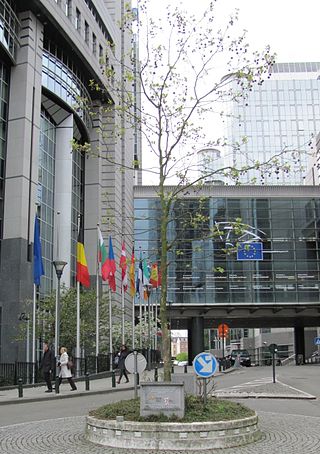Declarations of financial interests are a means of making conflict of interests of people in public office known and to reduce them by making them public.
Declarations of financial interests are a means of making conflict of interests of people in public office known and to reduce them by making them public.
Members of the European Parliament (MEPs) are required to declare their financial interests or assets that could create a situation of conflict in the performance of their duties.
As in a majority of the Member States, Members of the European Parliament have an obligation to declare their financial interests at the moment of taking office as well as orally when a Member has an interest in one of the issues being debated at a sitting.
Members of the European Parliament are also required to update their declaration of financial interests every year. Their declarations are included in the public register kept by the Quaestors. The register is public and may be consulted by anyone in Parliament's three places of work (Strasbourg, Luxembourg and Brussels) via the Internet on the MEP's page in the online register.
In vote on March 11, 1999, about the report A4-0070/99 (Corbett, Gutiérrez Diaz, Palacio Vallelersundi) was adopted, numerous changes to the Rules of Procedure of the European Parliament designed to enable Parliament to adjust to the workings of the Amsterdam Treaty have been adopted:
MEPs voted to tighten the rules relating to the declaration of financial interests. The rule thus stipulates that the names of members who have not completed the register within the due time limit will be published in the minutes after due warning. The rule then goes on to state "if the member continues to refuse to submit the declaration after the infringement has been published,The President shall take action in accordance with Rule 124 to suspend the member concerned."
The original proposal to oblige members to declare all benefits above .100 was not approved, but another amendment designed to exclude members not completing the register from office in the Parliament did go through as did the amendment obliging chairmen of intergroups and other unofficial grouping to declare all forms of financial or secretarial support.

The European Parliament (EP) is one of the legislative bodies of the European Union and one of its seven institutions. Together with the Council of the European Union, it adopts European legislation, following a proposal by the European Commission. The Parliament is composed of 705 members (MEPs), due to rise to 720 after the June 2024 European elections. It represents the second-largest democratic electorate in the world, with an electorate of 375 million eligible voters in 2009.
In politics, lobbying, or advocacy, is the act of lawfully attempting to influence the actions, policies, or decisions of government officials, most often legislators or members of regulatory agencies, but also judges of the judiciary. Lobbying, which usually involves direct, face-to-face contact in cooperation with support staff that may not meet directly face-to-face, is done by many types of people, associations and organized groups, including individuals on a personal level in their capacity as voters, constituents, or private citizens; it is also practiced by corporations in the private sector serving their own business interests; by non-profits and non-governmental organizations in the voluntary sector through advocacy groups to fulfil their mission such as requesting humanitarian aid or grantmaking; and by fellow legislators or government officials influencing each other through legislative affairs in the public sector.

A popular initiative is a form of direct democracy by which a petition meeting certain hurdles can force a legal procedure on a proposition. The hurdles the petition has to meet vary between countries, typically signatures by a certain number of registered voters.

A member of the European Parliament (MEP) is a person who has been elected to serve as a popular representative in the European Parliament.
A constitutional amendment is a modification of the constitution of a polity, organization or other type of entity. Amendments are often interwoven into the relevant sections of an existing constitution, directly altering the text. Conversely, they can be appended to the constitution as supplemental additions, thus changing the frame of government without altering the existing text of the document.
A supermajority is a requirement for a proposal to gain a specified level of support which is greater than the threshold of more than one-half used for a simple majority. Supermajority rules in a democracy can help to prevent a majority from eroding fundamental rights of a minority, but they can also hamper efforts to respond to problems and encourage corrupt compromises at times when action is taken. Changes to constitutions, especially those with entrenched clauses, commonly require supermajority support in a legislature. Parliamentary procedure requires that any action of a deliberative assembly that may alter the rights of a minority have a supermajority requirement, such as a two-thirds vote. In consensus democracy the supermajority rule is applied in most cases.

A European political party, known formally as a political party at European level and informally as a European party or a Europarty, is a type of political party organisation operating transnationally in Europe and within the institutions of the European Union (EU). They are regulated and funded by EU Regulation 1141/2014 on the statute and funding of European political parties and European political foundations, and their operations are supervised by the Authority for European Political Parties and European Political Foundations (APPF). European political parties – mostly consisting of national member parties, and few individual members – have the right to campaign during the European elections, for which they often adopt manifestos outlining their positions and ambitions. Ahead of the elections, some of them designate their preferred candidate to be the next President of the European Commission.

The political structure of the European Union (EU) is similar to a confederation, where many policy areas are federalised into common institutions capable of making law; the competences to control foreign policy, defence policy, or the majority of direct taxation policies are mostly reserved for the twenty-seven state governments. These areas are primarily under the control of the EU's member states although a certain amount of structured co-operation and coordination takes place in these areas. For the EU to take substantial actions in these areas, all Member States must give their consent. Union laws that override State laws are more numerous than in historical confederations; however, the EU is legally restricted from making law outside its remit or where it is no more appropriate to do so at a state or local level (subsidiarity) when acting outside its exclusive competences. The principle of subsidiarity does not apply to areas of exclusive competence.

The European Union adopts legislation through a variety of legislative procedures. The procedure used for a given legislative proposal depends on the policy area in question. Most legislation needs to be proposed by the European Commission and approved by the Council of the European Union and European Parliament to become law.

Markets in Financial Instruments Directive 2014, commonly known as MiFID 2, is a legal act of the European Union (EU). Together with Regulation No 600/2014 it provides a legal framework for securities markets, investment intermediaries, in addition to trading venues. The directive provides harmonised regulation for investment services of the member states of the European Economic Area — the EU member states plus Iceland, Norway and Liechtenstein. Its main objectives are to increase competition and investor protection, as well as level the playing field for market participants in investment services. It repeals Directive 2004/39/EC.

The committees of the European Parliament are designed to aid the European Commission in initiating legislation.

The Constitution of Latvia is the fundamental law of the Republic of Latvia. Satversme is the oldest Eastern or Central European constitution still in force and the sixth oldest still-functioning republican basic law in the world. It was adopted, as it states itself in the text, by the people of Latvia, as represented in the Constitutional Assembly of Latvia, on 15 February 1922 and came into force on 7 November 1922. It was heavily influenced by Germany's Weimar Constitution and the Swiss Federal Constitution. The constitution establishes the main bodies of government ; it consists of 116 articles arranged in eight chapters.
In politics, a revolving door is a situation in which personnel move between roles as legislators and regulators, on one hand, and employees or lobbyists of the industries affected by the legislation and regulation, on the other. It is analogous to the movement of people in a physical revolving door. Political analysts claim that an unhealthy relationship can develop between the private sector and government, based on the granting of reciprocated privileges to the detriment of the nation, and can lead to regulatory capture.

The current Constitution of Mauritania was adopted on 12 July 1991. There have been several constitutions since Mauritania's independence in 1960.

The Treaty of Lisbon is an international agreement that amends the two treaties which form the constitutional basis of the European Union (EU). The Treaty of Lisbon, which was signed by all EU member states on 13 December 2007, entered into force on 1 December 2009. It amends the Maastricht Treaty (1992), known in updated form as the Treaty on European Union (2007) or TEU, as well as the Treaty of Rome (1957), known in updated form as the Treaty on the Functioning of the European Union (2007) or TFEU. It also amends the attached treaty protocols as well as the Treaty establishing the European Atomic Energy Community (EURATOM).

The European Citizens' Initiative (ECI) is a European Union (EU) mechanism aimed at increasing direct democracy by enabling "EU citizens to participate directly in the development of EU policies", introduced with the Treaty of Lisbon in 2007. This popular initiative enables one million citizens of the European Union, with a minimum number of nationals from at least seven member states, to call directly on the European Commission to propose a legal act in an area where the member states have conferred powers onto the EU level. This right to request the commission to initiate a legislative proposal puts citizens on the same footing as the European Parliament and the European Council, who enjoy this right according to Articles 225 and 241 TFEU, respectively. The commission holds the right of initiative in the EU. The first registered ECI, Fraternité 2020, was initiated on 9 May 2012, although the first submitted ECI was One Single Tariff.
The Commission for the Prevention of Corruption of the Republic of Slovenia is an independent anti-corruption agency with a broad mandate in the field of preventing and investigating corruption, breaches of ethics and integrity of public office. The commission's activity is legally based on the 2010 Act on Integrity and prevention of corruption with later amendments. Before the commission's establishment Slovenia had an eight-year history of anti-corruption governmental bodies.
A Lobby Registry, also named Lobbyist Registry, Register for Lobby Transparency or Registry of Lobbyists is a public database, in which information about lobbying actors and key data about their actions can be accessed.

Lobbying in the European Union, also referred to officially as European interest representation, is the activity of representatives of diverse interest groups or lobbies who attempt to influence the executive and legislative authorities of the European Union through public relations or public affairs work. The Treaty of Lisbon introduced a new dimension of lobbying at the European level that is different from most national lobbying. At the national level, lobbying is more a matter of personal and informal relations between the officials of national authorities, but lobbying at the European Union level is increasingly a part of the political decision-making process and thus part of the legislative process. 'European interest representation' is part of a new participatory democracy within the European Union. The first step towards specialised regulation of lobbying in the European Union was a Written Question tabled by Alman Metten, in 1989. In 1991, Marc Galle, Chairman of the Committee on the Rules of Procedure, the Verification of Credentials and Immunities, was appointed to submit proposals for a Code of conduct and a register of lobbyists. Today lobbying in the European Union is an integral and important part of decision-making in the EU. From year to year lobbying regulation in the EU is constantly improving and the number of lobbyists is increasing.

The 2024 European Parliament election is scheduled to be held on 6 to 9 June 2024. This will be the tenth parliamentary election since the first direct elections in 1979, and the first European Parliament election after Brexit. This election will also coincide with a number of other elections in the European Union.